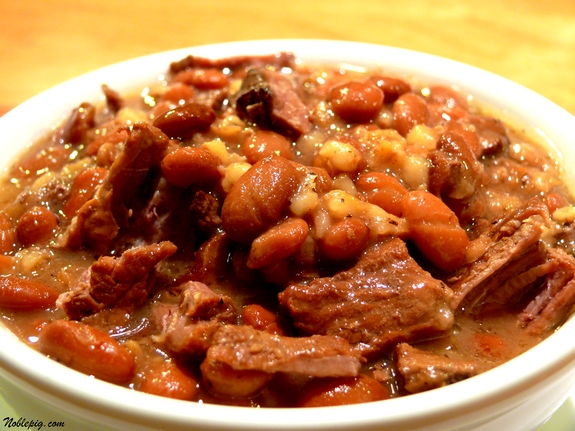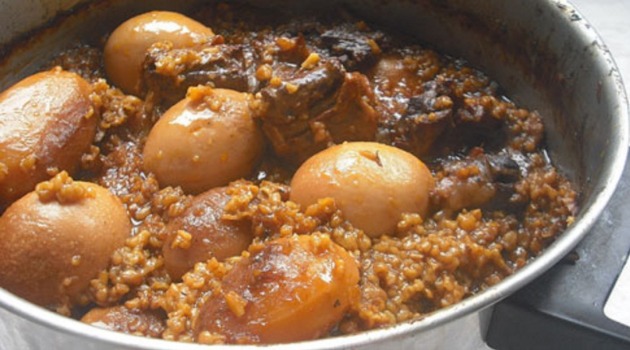Cholent
As cholent or Tschulent ( Yiddish: טשאָלנט, pronunciation: [ tʃolənt ] or [ tʃʊlənt ], Hebrew Chamin חמין, German: hot), a stew of Ashkenazi Jewish cuisine is known for the lunch meal on Shabbat in Ostjiddischen, the Friday before Shabbat for cooking is brought and finish cooking over low heat until Saturday noon. There are many regional variations that westjiddische correspondence is the Shalet, which is related to the Eastern European Fludn and ball. The German poet Heinrich Heine mentions him several times and sings about him in the poem "Princess Sabbath," from 1851, among other things with the words: " Shalet, beautiful spark of the gods, Daughter of Elysium "
Basic components of a Tscholents are meat, beans, grains and potatoes. The court is also widely known by other names in the Sephardic cuisine. For the typical Sephardic versions is the addition of hard-boiled eggs, the Huevos Haminados.
The stew is probably from Spain, where he was known as Adafina and arrived in the Middle Ages through France to Central and Eastern Europe later. The emergence of these courts is due to the Shabbat laws. These prohibit the kindling of fire on Shabbat, but allow, under certain conditions, the use of a lit before the Shabbat fire during Shabbat.
The name cholent is first recorded in writing for the 13th century. He is of Roman origin. According to popular opinion, he should ( German: hot) from the French words chaud: be derived and lent (slow German ). The linguist Max Weinreich is, however, assumed that he from the Latin Calens, calentem: via Old French chalant was borrowed into Yiddish ( German what is hot). A folk etymology explains the name Tschulent as a school -end, resulting in the Yiddish dialects call the synagogue as a school, the end ( of worship in ) is called the synagogue. The importance of context arises from the fact that the Tschulent, previously traditionally cooked at the baker in the community oven in a special sealed with dough pot was posted on Saturday picked up late morning after the synagogue visit on the way home and then, just after school end, eaten. He was carried home, thanks to the so-called Eruv that allows according to Jewish religious law otherwise not allowed wearing on Shabbat.










